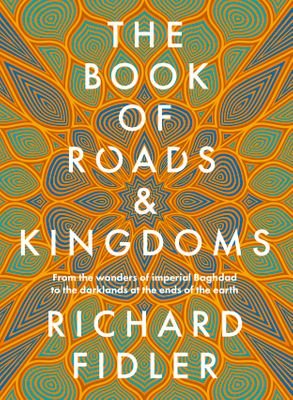
Frankopan’s thesis that following the rise of Islam, Central Asia became not only the centre of world trade, but somewhere where science, the arts and ideas flourished and spread across the world, challenged my understanding of world history, and triggered an interest in this fascinating part of the world.
Richard Fidler’s new book, The Book of Roads & Kingdoms is a history of central Asia. It is named after a book of the same name written by eleventh century geographer Abu Abdullah al Bakriand traces the rise and fall of the Muslim empire. From its early days when Muhammad drew up the constitution of the first Islamic State in Medina; to Islam’s rapid expansion out of Arabia into Iraq and Iran and the founding of Bagdad as the City of Peace. It then details Islam’s golden age when the caliphs of Bagdad presided over an empire greater than the Roman Empire at its peak, and ends with the capture and ransacking of Bagdad in 1256 by the Mongols.
Fidler’s book is well researched and draws on historical records, travellers’ and traders’ tales, poetry, and even folk stories from the One thousand and One nights. From this material Fidler skilfully weaves together a picture of the caliphate as a complex, outward looking civilisation, where science and the arts thrived, and the citizenry were encouraged to seek knowledge from all over the world.
The book is divided into six “chapters”. The first details the emergence of Islam as a political force that arose from the desert to challenge the waning Persian and Roman empires. The next four chapters detail the expansion of the Moslem empire from its capital Bagdad on the Tigris River across the known world. The last covers the fall of the caliphate at the hands of Genghis Khan and his grandson Hulagu
Many of the historical figures in the book were unfamiliar to me and so I found Fidler’s listing of the major characters at the start of each chapter most helpful. Also useful were the small but informative maps located at strategic points in the narrative.
It is almost impossible to condense 500 years of history into 400 pages and there are some obvious gaps in The Book of Roads & Kingdoms such as the lack of any discussion about the role Cordoba played in the caliphate. There are also some odd diversions from the book’s main theme, such as the section where Fidler describes a horrific Viking funeral ceremony based upon the diaries of traveller and trader Ibn Fadlan.
Nevertheless, these are minor blemishes in an entertaining and important book which shines a light on Islam’s proud history and its contribution to world knowledge. It is also a timely book in its portrayal of Muslims as an inquisitive, and cultured people. A description which is significantly at odds with the way Muslims have been depicted in western media for the past two decades.
Review by Fox Rogers





